新人教版必修4Unit 1 Women of achievement知识点课件(50张ppt)
文档属性
| 名称 | 新人教版必修4Unit 1 Women of achievement知识点课件(50张ppt) |

|
|
| 格式 | zip | ||
| 文件大小 | 681.5KB | ||
| 资源类型 | 教案 | ||
| 版本资源 | 人教版(新课程标准) | ||
| 科目 | 英语 | ||
| 更新时间 | 2019-08-25 00:00:00 | ||
图片预览

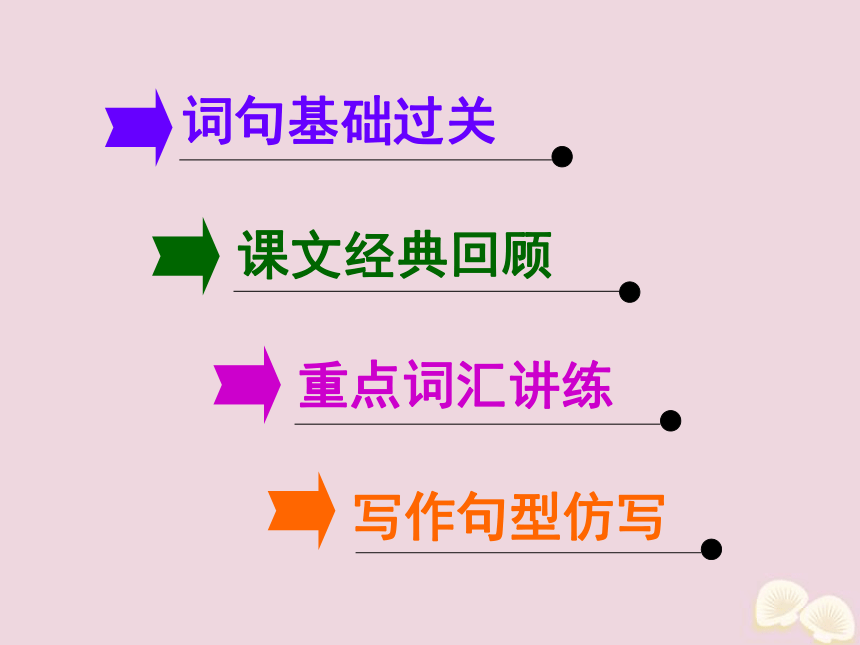

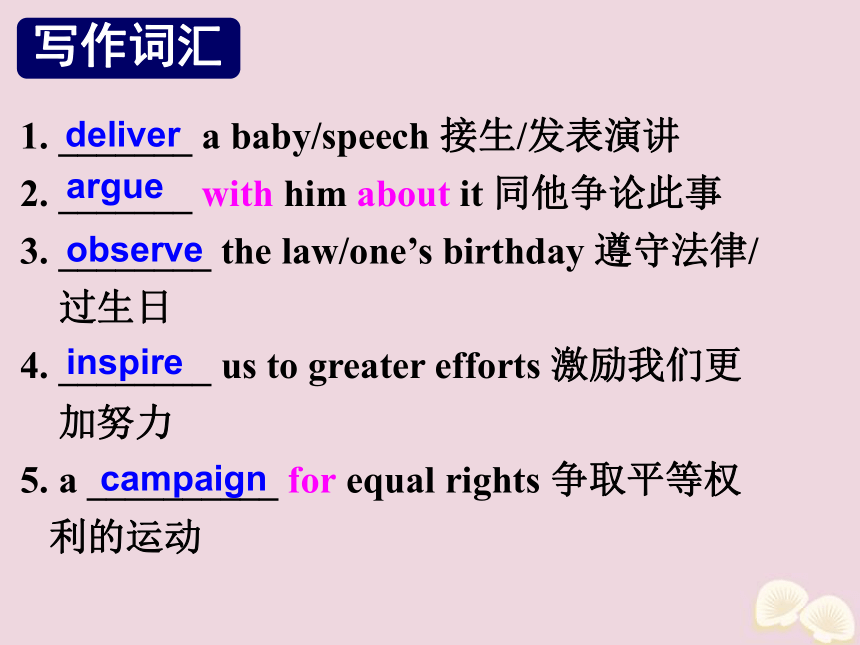
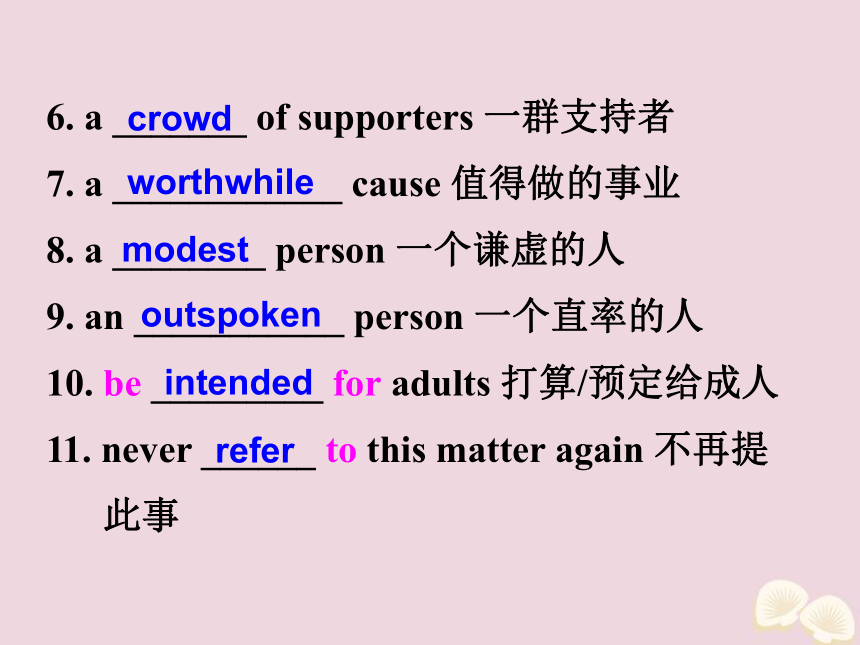
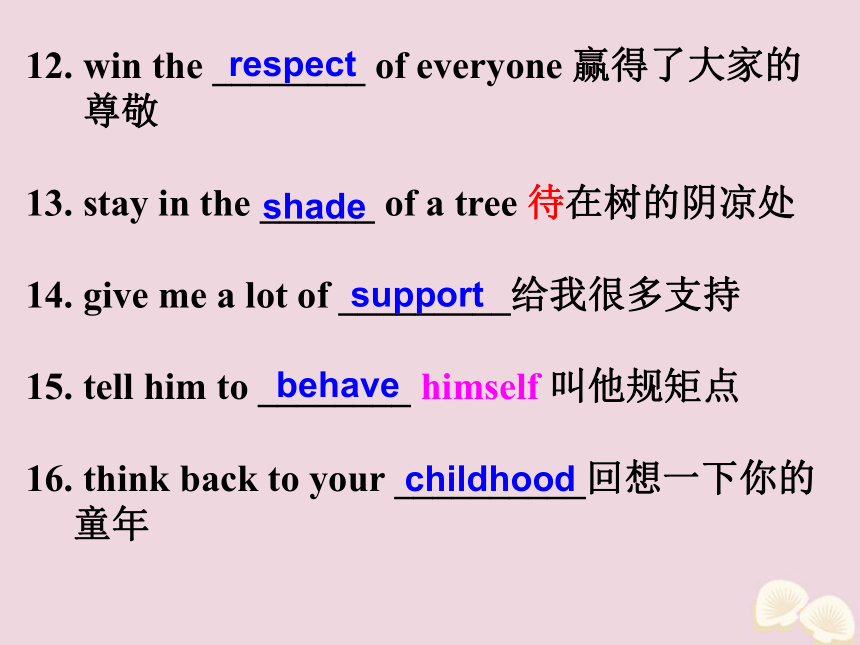
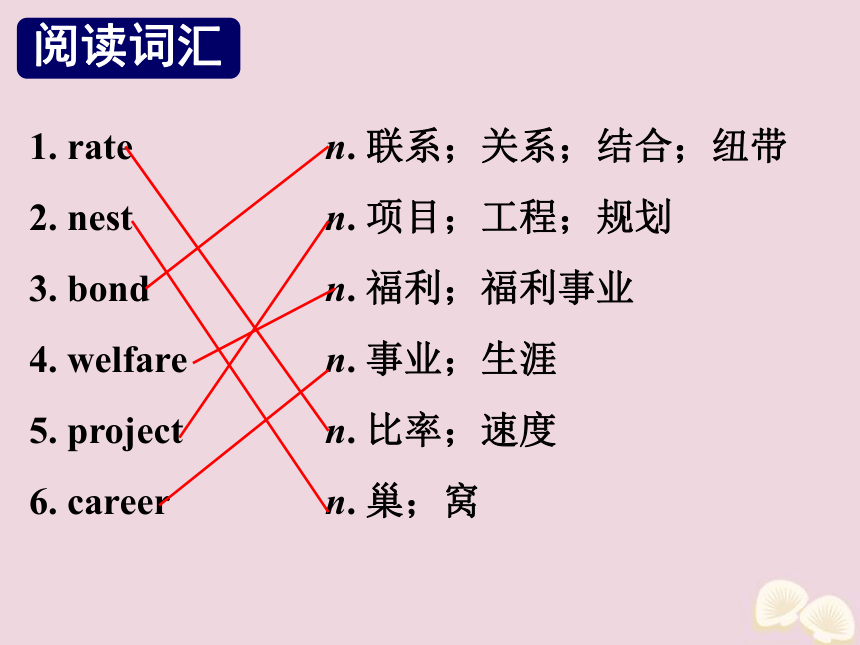

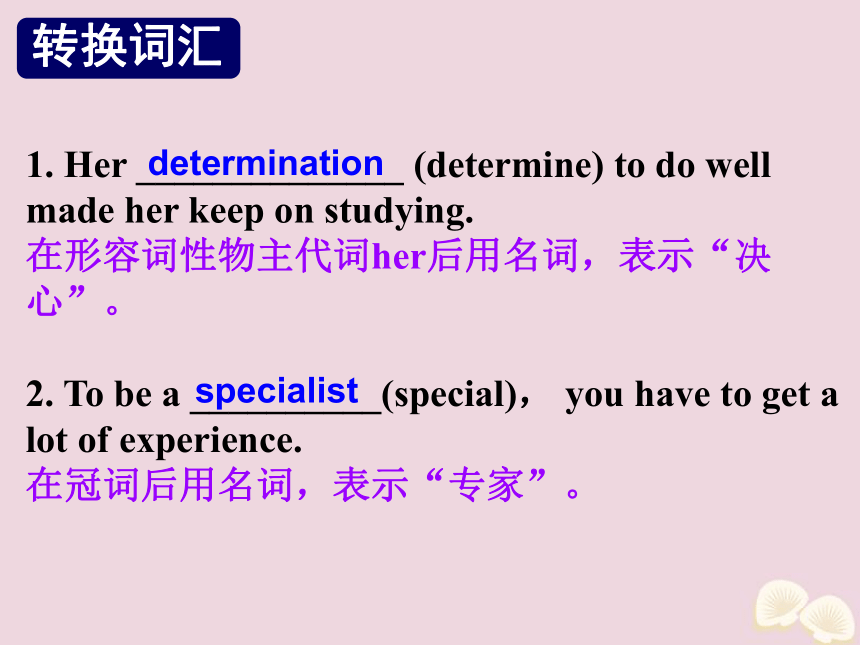
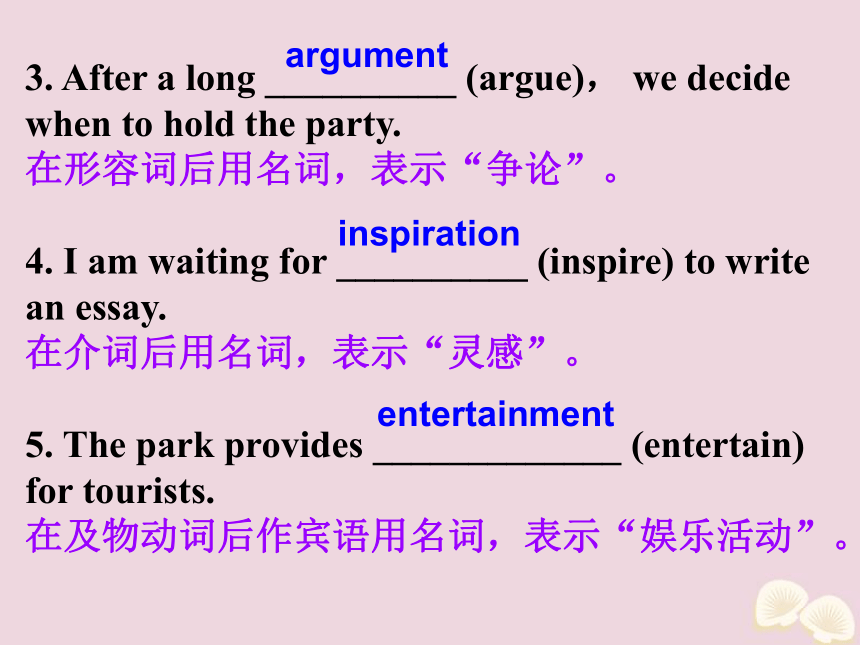
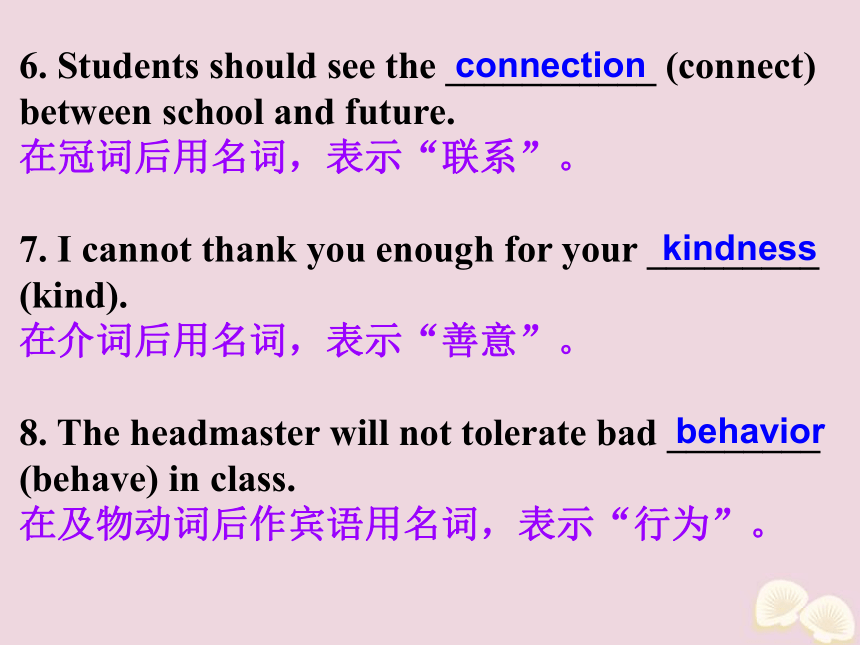
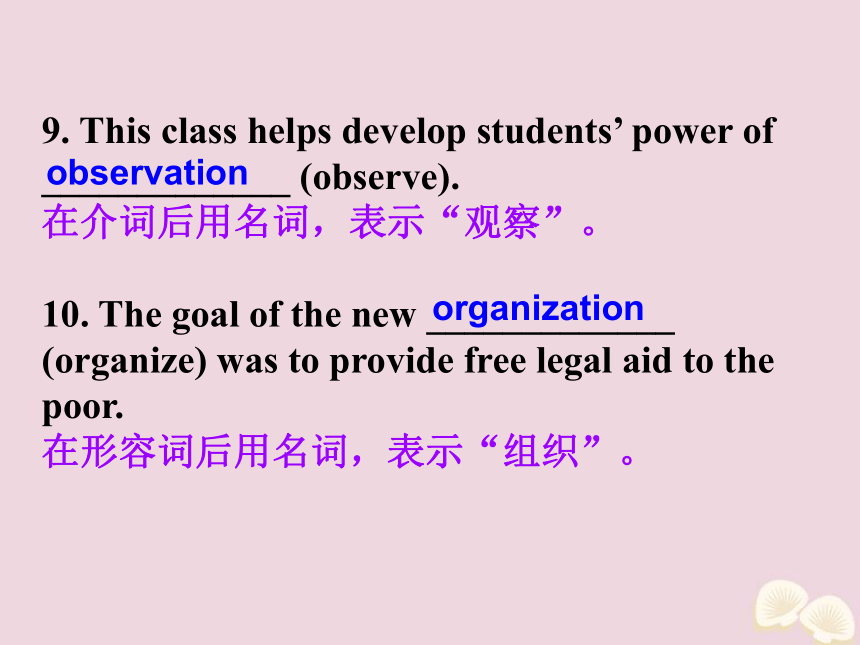
文档简介
(共50张PPT)
Unit 1 Women of achievement
课文经典回顾
重点词汇讲练
写作句型仿写
词句基础过关
1. _______ a baby/speech 接生/发表演讲
2. _______ with him about it 同他争论此事
3. ________ the law/one’s birthday 遵守法律/
过生日
4. ________ us to greater efforts 激励我们更
加努力
5. a __________ for equal rights 争取平等权
利的运动
campaign
deliver
argue
observe
inspire
6. a _______ of supporters 一群支持者
7. a ____________ cause 值得做的事业
8. a ________ person 一个谦虚的人
9. an ___________ person 一个直率的人
10. be _________ for adults 打算/预定给成人
11. never ______ to this matter again 不再提
此事
refer
crowd
worthwhile
modest
outspoken
intended
12. win the ________ of everyone 赢得了大家的
尊敬
13. stay in the ______ of a tree 待在树的阴凉处
14. give me a lot of _________给我很多支持
15. tell him to ________ himself 叫他规矩点
16. think back to your __________回想一下你的
童年
childhood
respect
shade
support
behave
1. rate n. 联系;关系;结合;纽带
2. nest n. 项目;工程;规划
3. bond n. 福利;福利事业
4. welfare n. 事业;生涯
5. project n. 比率;速度
6. career n. 巢;窝
7. institute n. 一代;一辈
8. audience adj. 考虑周到的
9. specialize n. 观众;听众;读者
10. emergency n. 学会;学院;协会
11. generation n. 突发事件;紧急情况
12. considerate vi. 专攻; 专门从事; 专注于
1. Her ______________ (determine) to do well made her keep on studying.
在形容词性物主代词her后用名词,表示“决心”。
2. To be a __________(special), you have to get a lot of experience.
在冠词后用名词,表示“专家”。
determination
specialist
3. After a long __________ (argue), we decide when to hold the party.
在形容词后用名词,表示“争论”。
4. I am waiting for __________ (inspire) to write an essay.
在介词后用名词,表示“灵感”。
5. The park provides _____________ (entertain) for tourists.
在及物动词后作宾语用名词,表示“娱乐活动”。
entertainment
inspiration
argument
6. Students should see the ___________ (connect) between school and future.
在冠词后用名词,表示“联系”。
7. I cannot thank you enough for your _________ (kind).
在介词后用名词,表示“善意”。
8. The headmaster will not tolerate bad ________ (behave) in class.
在及物动词后作宾语用名词,表示“行为”。
behavior
kindness
connection
9. This class helps develop students’ power of _____________ (observe).
在介词后用名词,表示“观察”。
10. The goal of the new _____________ (organize) was to provide free legal aid to the poor.
在形容词后用名词,表示“组织”。
organization
observation
11. An Olympic gold medal is a remarkable ____________ (achieve) for players.
在冠词后用名词,表示“成就”。
12. My teacher has to ask for a leave due to __________ (sick).
在介词后用名词,表示“生病”。
13. It is kind of you to take my advice into _____________ (consider).
在介词后用名词,表示“考虑”。
achievement
sickness
consideration
1. ______________人类
2. ________________ a dictionary查阅字典
3. ____________ some old photos偶然翻到旧照片
4. _________ the family business继承家业
5. ____________________ 过着简朴的生活
6. don’t __________________ clean workers不要
看不起清洁工
look down upon/on
human being
refer to/consult
come across
carry on
lead/live a simple life
7. meet him __________ 偶然遇见他
8. crowd _____ the stadium涌入体育场
9. The train slowly moved ____. 火车徐徐开动了。
10. behave _________ me like a friend像朋友一
样对待我
11. respect him ____ his honesty因诚实而尊敬他
12. show respect ____ teachers尊敬老师
for
by chance/by accident
into
off
towards
for
13. devote himself ____ writing 他专心写作
14. argue ____________ tax increases据理反对/
赞成增税
15. inspire us _______(try) again鼓舞我们再做
尝试
16. He means ______ (be) a teacher. 他打算当
老师。
17. Success means _________(work) hard. 成功
意味着努力。
18. We chose _______ (go) by train. 我们决定乘
火车去。
to go
to
against/for
to try
to be
working
1. Once I stop,it all _______ (come) crowding in and I remember the chimps in laboratories. 我一旦停下来,所有的一切都会涌上心头,我就会想起实验室里的黑猩猩。
2. Only ______ her mother came to help her for the first few months was she allowed to begin her project. 她母亲头几个月来,帮过她的忙,这才使她得以开始自己的计划。
after
comes
3. ___________(follow) Jane’s way of studying chimps, our group are all going to visit them in the forest.我们一行人准备按照简研究黑猩猩的方法去森林里拜访它们。
4. Suddenly it hit me ______difficult it was for
a woman to get medical training at that time. 我突然想起在那个年代,一个女子去学医是多么困难。
how
Following
5. _____ seemed that she had been very busy in her chosen career,travelling abroad to study as well as _________(write) books and articles.她似乎一直都在为自己所选择的事业而奔波,去国外留学,并写了很多书和文章。
writing
It
Nobody before Jane fully understood
chimps’ behavior. She spent years observing
and 1 __________ (record) their daily activities. 2 ______ her childhood she had wanted to
work with animals in their own environment.
3 __________ , this was not easy. When she first arrived in Gombe in 1960,it was 4 _________ (usual) for a woman 5 _______(live) in the forest. Only after her mother came to help her for the first few 6 ________(month) was she allowed to begin her project.
months
recording
Since
However
unusual
to live
Her work changed the way people think about chimps. For example,one important thing she discovered 7 ______(be) that chimps hunt and eat meat. Until then everyone 8 ____________ (think) chimps ate only fruit and nuts. She actually observed chimps as a group 9 _______ (hunt) a monkey and then eating it. She also discovered how chimps communicate 10 ______ each other,and her study of their body language helped her work out their social system.
with
was
had thought
hunting
For forty years Jane Goodall had been
outspoken about making the rest of a world
understand and respect the life of these animals. She has argued that wild animals should left in
the wild and not used for entertainment and
advertisements. She has helped to set up special
places where they can live in safely.
She is leading a busy life but she says: “Once I stop, it all comes crowding in and I remembering
the chimps in laboratories. It’s terribly. It affects
me when I watch the wild chimp. I say to me,
‘Aren’t they lucky?’ And then I think about small chimps in cages though they have done something
wrong. Once you have seen that, you can never forget …”
1. had→ has 由forty years可知用现在完成时。
2. a world→ the world 当表示世界上独一无二的东西要用the。
3. 在left前加be 因wild animals与leave之间是被动关系,故在left前加be。
4. and→ or 在否定句中,连接两个并列成分一般用or而不用and,故advertisements前的and应改为or。
5. 去掉live后的in 因where=in which,故live in中的in重复,应去掉。
6. remembering→ remember 在主语I后作谓语,又是一般现在时。
7. terribly→ terrible 在系动词be后作表语,用形容词。
8. chimp→ chimps 用复数表示泛指。
9. me→ myself 由固定短语say to oneself可知。
10. something→ nothing 根据though可知此处想表达的是“尽管小黑猩猩没有任何过错,却被关在笼子里”,故改用nothing。
campaign for/ against… 争取/ 反对…的运动
1. campaign n. 运动;战役
vi. 作战;参加运动
⑴ She started a campaign ________________ (对抗污染).
⑵ The leaders of the union are campaigning ____ better working conditions.
for
against pollution
observe sb do sth如果改成被动语态, 应补上省略的to, 即sb be observed to do sth。
2. observe vt.& vi. 观察;注意;遵守(法律、习俗等);庆祝(节日等)
observe sb doing sth 看到某人正在做某事
observe sb do sth 看到某人做了某事
(1) When I passed his house, I observed
him ________ (play) in his yards.
(2) The police observed the man _______ (enter) the bank.
(3) The man was observed ________(enter) the bank by the police.
to enter
playing
enter
argue with sb about/over sth 与某人争论某事
argue sb into/out of doing sth 说服某人做某事/不做某事
3. argue vi.& vt. 争论;辩论;讨论;
用辩论证明
argument n. 争论, 辩论;论据, 论点
(1) We ________________________________ scientific farming. (argue)
(2) We ________________________________ __________ scientific farming. (persuade)
(3) We ________________________________ scientific farming. (convince)
我们说服农民要相信科学种田。(一句多译)
convinced the peasants to believe
argued the peasants into believing
persuaded the peasants into believing/
to believe
intention n. 意图;目的;打算
with the intention of 抱有…的目的;打算
4. intend vt.计划;打算;想要
intend to do/doing sth 打算做某事
intend sb to do sth 打算让某人做某事
sb intends/intended that… 某人主张……
be intended to do sth/for sth 专门为/给……
had intended to do sth=intended to have done sth 打算做某事但没有做成
(1) Also, to improve our English and get
more students interested in English, I intend ______________________ (organize) some activities at school.
(2) My mother bought a book for me with the _________ (intend) of learning French.
intention
to organize/organizing
(3) Younger people shouldn’t be doing exercise _________ (intend) for 18 years old.
(4) He intends his son ____________(manage) the company when he retires.
to manage
intended
crowd into the hall涌进大厅
be crowded with满是
5. crowd in (on sb) (想法、问题等)涌上
(某人)心头
⑴ 她心乱如麻。
Too many uncomfortable thoughts
_____________________________________
_________.
⑵ 人群涌入拥挤的街道。
The crowd _____________________________.
crowded into the crowded street
are crowding into her mind/are crowding
in on her
⑴ 过着幸福的生活lead a _______ life
⑵ 过着简朴的生活lead a _______ life
⑶ 过着艰苦的生活lead a ___________ life
⑷ 过着凄惨的生活lead a ________________ life
⑸ 过着舒适的生活lead a ____________ life
6. lead/live a…life过着……的生活
comfortable
happy
simple
hard/tough
miserable/dog’s
她父母叫她不要瞧不起乡下人。
7. look down upon看不起;藐视
Her parents tell her not to look down upon/ on countrymen.
⑴ 你的评论是针对我们所有人的吗?
Does your remark ________________?
⑵ 你可以在字典里查这个单词的意思。
You can _____________________ to find
the meaning of this word.
8. refer to查阅;参考;谈到
refer to the dictionary
refer to all of us
如果你继续那样驾驶,你会出事故的。
You’ll have an accident if you carry on
________ (drive) like that.
9. carry on继续(continue);坚持
driving
⑴ 电脑的应用使我们的工作更有效率。
Using computers _____________________
_________.
⑵ 运动使我们健康强壮。
Having sports __________________________.
1. make+宾语+宾补 使……怎么样
makes our work more
makes us healthy and strong
efficient
⑴ 只有到那时我才明白她的意思。
______________ I understand what she meant.
2. only+状语+助动词/ 情态动词/ be+主语
Only then did
⑵ 只有用这种方法我们才能完成这项工作。
____________________ we finish this work.
⑶ 只有在杰克回来后我才得知真相。
Only after Jack returned did I learn about the truth.
Only in this way can
⑴ 一旦你有了信心,在面试中你就能成功。
Once you have confidence, you will be successful in the interview.
⑵ 我一到那里,就会跟你联络的。
___________________, I’ll contact you.
3. Once…一旦……(引导状语从句)
Once I arrive there
It suddenly occurs to sb that… 某人突然想到……
4. It hits/strikes me+从句 我突然想到……
Suddenly he remembered that he had left his keys in the office.
→(1) _________ that he had left his keys in the office.
→(2) __________________________ that he had left his keys in the office.
→(3) _____________ that he had left his keys in the office.
It struck him
It hit him
It suddenly occurred to him
Unit 1 Women of achievement
课文经典回顾
重点词汇讲练
写作句型仿写
词句基础过关
1. _______ a baby/speech 接生/发表演讲
2. _______ with him about it 同他争论此事
3. ________ the law/one’s birthday 遵守法律/
过生日
4. ________ us to greater efforts 激励我们更
加努力
5. a __________ for equal rights 争取平等权
利的运动
campaign
deliver
argue
observe
inspire
6. a _______ of supporters 一群支持者
7. a ____________ cause 值得做的事业
8. a ________ person 一个谦虚的人
9. an ___________ person 一个直率的人
10. be _________ for adults 打算/预定给成人
11. never ______ to this matter again 不再提
此事
refer
crowd
worthwhile
modest
outspoken
intended
12. win the ________ of everyone 赢得了大家的
尊敬
13. stay in the ______ of a tree 待在树的阴凉处
14. give me a lot of _________给我很多支持
15. tell him to ________ himself 叫他规矩点
16. think back to your __________回想一下你的
童年
childhood
respect
shade
support
behave
1. rate n. 联系;关系;结合;纽带
2. nest n. 项目;工程;规划
3. bond n. 福利;福利事业
4. welfare n. 事业;生涯
5. project n. 比率;速度
6. career n. 巢;窝
7. institute n. 一代;一辈
8. audience adj. 考虑周到的
9. specialize n. 观众;听众;读者
10. emergency n. 学会;学院;协会
11. generation n. 突发事件;紧急情况
12. considerate vi. 专攻; 专门从事; 专注于
1. Her ______________ (determine) to do well made her keep on studying.
在形容词性物主代词her后用名词,表示“决心”。
2. To be a __________(special), you have to get a lot of experience.
在冠词后用名词,表示“专家”。
determination
specialist
3. After a long __________ (argue), we decide when to hold the party.
在形容词后用名词,表示“争论”。
4. I am waiting for __________ (inspire) to write an essay.
在介词后用名词,表示“灵感”。
5. The park provides _____________ (entertain) for tourists.
在及物动词后作宾语用名词,表示“娱乐活动”。
entertainment
inspiration
argument
6. Students should see the ___________ (connect) between school and future.
在冠词后用名词,表示“联系”。
7. I cannot thank you enough for your _________ (kind).
在介词后用名词,表示“善意”。
8. The headmaster will not tolerate bad ________ (behave) in class.
在及物动词后作宾语用名词,表示“行为”。
behavior
kindness
connection
9. This class helps develop students’ power of _____________ (observe).
在介词后用名词,表示“观察”。
10. The goal of the new _____________ (organize) was to provide free legal aid to the poor.
在形容词后用名词,表示“组织”。
organization
observation
11. An Olympic gold medal is a remarkable ____________ (achieve) for players.
在冠词后用名词,表示“成就”。
12. My teacher has to ask for a leave due to __________ (sick).
在介词后用名词,表示“生病”。
13. It is kind of you to take my advice into _____________ (consider).
在介词后用名词,表示“考虑”。
achievement
sickness
consideration
1. ______________人类
2. ________________ a dictionary查阅字典
3. ____________ some old photos偶然翻到旧照片
4. _________ the family business继承家业
5. ____________________ 过着简朴的生活
6. don’t __________________ clean workers不要
看不起清洁工
look down upon/on
human being
refer to/consult
come across
carry on
lead/live a simple life
7. meet him __________ 偶然遇见他
8. crowd _____ the stadium涌入体育场
9. The train slowly moved ____. 火车徐徐开动了。
10. behave _________ me like a friend像朋友一
样对待我
11. respect him ____ his honesty因诚实而尊敬他
12. show respect ____ teachers尊敬老师
for
by chance/by accident
into
off
towards
for
13. devote himself ____ writing 他专心写作
14. argue ____________ tax increases据理反对/
赞成增税
15. inspire us _______(try) again鼓舞我们再做
尝试
16. He means ______ (be) a teacher. 他打算当
老师。
17. Success means _________(work) hard. 成功
意味着努力。
18. We chose _______ (go) by train. 我们决定乘
火车去。
to go
to
against/for
to try
to be
working
1. Once I stop,it all _______ (come) crowding in and I remember the chimps in laboratories. 我一旦停下来,所有的一切都会涌上心头,我就会想起实验室里的黑猩猩。
2. Only ______ her mother came to help her for the first few months was she allowed to begin her project. 她母亲头几个月来,帮过她的忙,这才使她得以开始自己的计划。
after
comes
3. ___________(follow) Jane’s way of studying chimps, our group are all going to visit them in the forest.我们一行人准备按照简研究黑猩猩的方法去森林里拜访它们。
4. Suddenly it hit me ______difficult it was for
a woman to get medical training at that time. 我突然想起在那个年代,一个女子去学医是多么困难。
how
Following
5. _____ seemed that she had been very busy in her chosen career,travelling abroad to study as well as _________(write) books and articles.她似乎一直都在为自己所选择的事业而奔波,去国外留学,并写了很多书和文章。
writing
It
Nobody before Jane fully understood
chimps’ behavior. She spent years observing
and 1 __________ (record) their daily activities. 2 ______ her childhood she had wanted to
work with animals in their own environment.
3 __________ , this was not easy. When she first arrived in Gombe in 1960,it was 4 _________ (usual) for a woman 5 _______(live) in the forest. Only after her mother came to help her for the first few 6 ________(month) was she allowed to begin her project.
months
recording
Since
However
unusual
to live
Her work changed the way people think about chimps. For example,one important thing she discovered 7 ______(be) that chimps hunt and eat meat. Until then everyone 8 ____________ (think) chimps ate only fruit and nuts. She actually observed chimps as a group 9 _______ (hunt) a monkey and then eating it. She also discovered how chimps communicate 10 ______ each other,and her study of their body language helped her work out their social system.
with
was
had thought
hunting
For forty years Jane Goodall had been
outspoken about making the rest of a world
understand and respect the life of these animals. She has argued that wild animals should left in
the wild and not used for entertainment and
advertisements. She has helped to set up special
places where they can live in safely.
She is leading a busy life but she says: “Once I stop, it all comes crowding in and I remembering
the chimps in laboratories. It’s terribly. It affects
me when I watch the wild chimp. I say to me,
‘Aren’t they lucky?’ And then I think about small chimps in cages though they have done something
wrong. Once you have seen that, you can never forget …”
1. had→ has 由forty years可知用现在完成时。
2. a world→ the world 当表示世界上独一无二的东西要用the。
3. 在left前加be 因wild animals与leave之间是被动关系,故在left前加be。
4. and→ or 在否定句中,连接两个并列成分一般用or而不用and,故advertisements前的and应改为or。
5. 去掉live后的in 因where=in which,故live in中的in重复,应去掉。
6. remembering→ remember 在主语I后作谓语,又是一般现在时。
7. terribly→ terrible 在系动词be后作表语,用形容词。
8. chimp→ chimps 用复数表示泛指。
9. me→ myself 由固定短语say to oneself可知。
10. something→ nothing 根据though可知此处想表达的是“尽管小黑猩猩没有任何过错,却被关在笼子里”,故改用nothing。
campaign for/ against… 争取/ 反对…的运动
1. campaign n. 运动;战役
vi. 作战;参加运动
⑴ She started a campaign ________________ (对抗污染).
⑵ The leaders of the union are campaigning ____ better working conditions.
for
against pollution
observe sb do sth如果改成被动语态, 应补上省略的to, 即sb be observed to do sth。
2. observe vt.& vi. 观察;注意;遵守(法律、习俗等);庆祝(节日等)
observe sb doing sth 看到某人正在做某事
observe sb do sth 看到某人做了某事
(1) When I passed his house, I observed
him ________ (play) in his yards.
(2) The police observed the man _______ (enter) the bank.
(3) The man was observed ________(enter) the bank by the police.
to enter
playing
enter
argue with sb about/over sth 与某人争论某事
argue sb into/out of doing sth 说服某人做某事/不做某事
3. argue vi.& vt. 争论;辩论;讨论;
用辩论证明
argument n. 争论, 辩论;论据, 论点
(1) We ________________________________ scientific farming. (argue)
(2) We ________________________________ __________ scientific farming. (persuade)
(3) We ________________________________ scientific farming. (convince)
我们说服农民要相信科学种田。(一句多译)
convinced the peasants to believe
argued the peasants into believing
persuaded the peasants into believing/
to believe
intention n. 意图;目的;打算
with the intention of 抱有…的目的;打算
4. intend vt.计划;打算;想要
intend to do/doing sth 打算做某事
intend sb to do sth 打算让某人做某事
sb intends/intended that… 某人主张……
be intended to do sth/for sth 专门为/给……
had intended to do sth=intended to have done sth 打算做某事但没有做成
(1) Also, to improve our English and get
more students interested in English, I intend ______________________ (organize) some activities at school.
(2) My mother bought a book for me with the _________ (intend) of learning French.
intention
to organize/organizing
(3) Younger people shouldn’t be doing exercise _________ (intend) for 18 years old.
(4) He intends his son ____________(manage) the company when he retires.
to manage
intended
crowd into the hall涌进大厅
be crowded with满是
5. crowd in (on sb) (想法、问题等)涌上
(某人)心头
⑴ 她心乱如麻。
Too many uncomfortable thoughts
_____________________________________
_________.
⑵ 人群涌入拥挤的街道。
The crowd _____________________________.
crowded into the crowded street
are crowding into her mind/are crowding
in on her
⑴ 过着幸福的生活lead a _______ life
⑵ 过着简朴的生活lead a _______ life
⑶ 过着艰苦的生活lead a ___________ life
⑷ 过着凄惨的生活lead a ________________ life
⑸ 过着舒适的生活lead a ____________ life
6. lead/live a…life过着……的生活
comfortable
happy
simple
hard/tough
miserable/dog’s
她父母叫她不要瞧不起乡下人。
7. look down upon看不起;藐视
Her parents tell her not to look down upon/ on countrymen.
⑴ 你的评论是针对我们所有人的吗?
Does your remark ________________?
⑵ 你可以在字典里查这个单词的意思。
You can _____________________ to find
the meaning of this word.
8. refer to查阅;参考;谈到
refer to the dictionary
refer to all of us
如果你继续那样驾驶,你会出事故的。
You’ll have an accident if you carry on
________ (drive) like that.
9. carry on继续(continue);坚持
driving
⑴ 电脑的应用使我们的工作更有效率。
Using computers _____________________
_________.
⑵ 运动使我们健康强壮。
Having sports __________________________.
1. make+宾语+宾补 使……怎么样
makes our work more
makes us healthy and strong
efficient
⑴ 只有到那时我才明白她的意思。
______________ I understand what she meant.
2. only+状语+助动词/ 情态动词/ be+主语
Only then did
⑵ 只有用这种方法我们才能完成这项工作。
____________________ we finish this work.
⑶ 只有在杰克回来后我才得知真相。
Only after Jack returned did I learn about the truth.
Only in this way can
⑴ 一旦你有了信心,在面试中你就能成功。
Once you have confidence, you will be successful in the interview.
⑵ 我一到那里,就会跟你联络的。
___________________, I’ll contact you.
3. Once…一旦……(引导状语从句)
Once I arrive there
It suddenly occurs to sb that… 某人突然想到……
4. It hits/strikes me+从句 我突然想到……
Suddenly he remembered that he had left his keys in the office.
→(1) _________ that he had left his keys in the office.
→(2) __________________________ that he had left his keys in the office.
→(3) _____________ that he had left his keys in the office.
It struck him
It hit him
It suddenly occurred to him
同课章节目录
